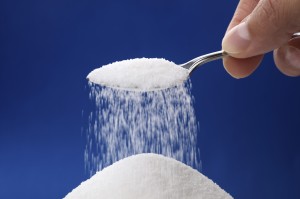Steel yourself against sugar cravings and critical illness with the same simple substance
I’ve devoted my life’s work to helping people end the vicious cycle of sugar addiction. And I’m happy to share my secrets whenever I can.
Secrets like l-glutamine.
It’s my go-to rescue remedy for sugar addicts. (And a whole lot of other conditions, too—as I’ll explain in just a moment.
First, though, let’s talk about what glutamine is and the many roles it plays in your body.
Glutamine is an amino acid—the most abundant in your body, actually. It provides energy to your muscles and your brain. And it regulates a number of biological functions, including the synthesis of protein, vitamin B3, and the antioxidant glutathione.
It’s also a world-class craving killer, for a few different reasons.
For starters, it’s able to inhibit insulin release during times of hypoglycemia, which prevents hard blood-sugar crashes. (The same crashes that often trigger intense cravings for sugar.)
It also stimulates your body to release stored glucose (called glycogen) in order to get low blood sugar back on track. And finally, glutamine is able to stand in for sugar itself when your body really needs the energy.
In a nutshell, glutamine ensures that your blood sugar never gets low enough that your body hits the panic button. That’s why I recommend glutamine to all my patients who are trying to give up sugar and/or lose weight.
But as I mentioned earlier, this amino acid has a long list of functions that go way beyond blood-sugar control.
Again, glutamine is abundant both in your body and from food sources—which means that most people have more than adequate stores to stay healthy.
But there are some factors that could make you an exception.
A battered digestive tract is one of them. Glutamine is a critical nutrient to the cells lining your gut, and acts as a primary source of fuel for them.
Research shows that glutamine is essential for reinforcing your GI tract, both repairing and guarding against gut damage. This is especially important for anyone with IBS, ulcerative colitis, celiac disease or any other irritating digestive condition that can erode the GI tract.
By combating conditions that lead to bowel permeability (more commonly known as “leaky gut”), glutamine can help to maximize nutrient absorption and minimize inflammation.
But the lining of your GI tract also hosts over half of your entire immune system. So keeping it in good shape is obviously much more than a matter of good digestion. That’s one reason why this amino acid has emerged as an essential form of support for the critically ill. But it’s not the only one.
Glutamine’s role in maintaining muscle makes it popular with bodybuilders. But the same benefit also guards against muscle and organ wasting in patients battling severe trauma or infection.
Glutamine is an essential ingredient in your body’s recovery process—whether it’s from a wound, surgery, or disease. And research indicates that ample or depleted stores don’t just dictate the speed with which your body rebounds. They could actually mean the difference between life and death.
The bottom line is, depleted glutamine levels rob your body of vital protection from a laundry list of health problems. But supplementing with this essential amino acid helps shore up immunity, ward off infection, and speed wound healing. Plus, clinical research traces a whole lot of other benefits back to glutamine, too. This amino acid can also…
- slow down the aging process of the skin—which means fewer wrinkles and less hair loss
- prevent fat storage
- protect your brain from toxins and sharpen memory
- help relieve anxiety, tension, sleep disorders, and insomnia
Glutamine supplements are widely available. I recommend 5,000 mg per day.
*******
Dr. Fred Pescatore is the author of the New York Times best-selling book, The Hamptons Diet and the No. 1 best-selling children’s health book, Feed Your Kids Well, amongst others. He is the President of the International and American Associations of Clinical Nutritionists, a member of the American College for the Advancement of Medicine, and belongs to many other professional organizations. Earlier in his career, Dr. Pescatore served as the Associate Medical Director of The Atkins Center for Complementary Medicine, working as the right-hand-man to the late, great Dr. Robert C. Atkins. Today he sees patients at his own practice in Manhattan and writes a monthly newsletter called Logical Health Alternatives, as well as a free e-letter called The Reality Health Check.
Source:
“Glutamine in critical illness: the time has come, the time is now.” Crit Care Clin. 2010;26(3):515-25, ix-x.
